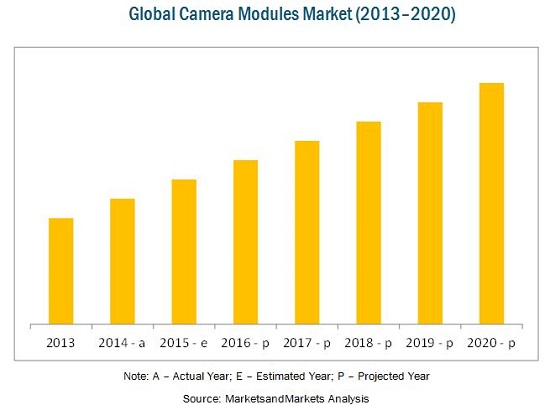The camera modules market has gained momentum in the recent past because of the growing global demand for consumer electronics devices, especially cameras, smartphones, and tablets. The enhancement in the image resolution of sensors along with the technological advancement in camera modules components and design is further driving this market. The growing market for advanced driver assistance systems (ADAS) in the automotive sector is boosting the demand for image sensors, and in turn, for camera modules.
Camera modules have recently found a major application in security & surveillance, automotive, and industrial sectors (especially in Machine Vision systems). These applications have recently started using cameras, creating a huge demand for camera modules. For instance, earlier only high-end cars would have cameras installed; now, however, even low-end cars are estimated to have more than 10 camera module to assist the driver for safe driving. The major components of camera modules are image sensor and lens modules.
Image sensor is a device that converts an optical image into an electronic/digital signal. It is implemented in camera modules and other imaging devices. It consists of millions of photodiodes and act as an image receiver in digital imaging equipment. It is widely used in digital cameras, camera modules, and other imaging devices. Analog sensors such as video tubes have been replaced mostly by CCD (Charge-Coupled Device) and CMOS (Complementary Metal-Oxide-Semiconductor) image sensors. A lens is an essential component of a camera module as it selects the quality of light incident on the image sensor and hence is responsible for the overall quality of the final output image.
The consumer electronics and security & surveillance sectors are expected to be the major applications of camera modules, thereby contributing to the growth of this market. The automotive sector is expected to grow at a high rate in this market. The market for image sensors is expected to grow at a CAGR of 10.2% between 2015 and 2020. The growing in demand for low-power and compact CMOS image sensors is driving the image sensor market. CMOS sensors offer various advantages over CCD sensors such as low power consumption, faster frame rate, ease of to manufacturing, and low cost. Moreover, advancements in CMOS design such as miniaturization and use of BSI technology made it possible to achieve better performance and quality of images even in low light conditions.
Currently, Asia-Pacific holds a large share in this market, followed by North America and Europe. The market in APAC is expected to grow at the highest CAGR of 12.1% between 2015 and 2020, to reach USD 15.48 billion by 2020. The Asia-Pacific market for camera modules is growing rapidly as most camera modules manufacturers are located in this region. Also, most of the demand for camera modules in the APAC region is from the consumer electronics application which includes smartphones, tablet PCs, cameras, and other devices. With the inclusion of secondary camera in smartphones, the demand for camera modules is expected to rise even further. In addition, the development of advanced driver assistance systems (ADAS) for the automotive application is also expected to boost the demand for camera modules in APAC. The global camera modules market report, along with its subsegments such as market by component, pixel, process, application, and geography provides valuable insights into the market and forecasts the same till 2020.
Do Inquiry Before Buying @ Click Here
There are a number of players in the camera modules market such as LG Electronics Inc. (South Korea), Samsung Electro-Mechanics Co., Ltd. (South Korea), Sharp Corporation (Japan), Lite-On Technology Corporation (Taiwan), Cowell e Holdings Inc. (China), Partron Co., Ltd. (Korea), Sunny Optical Technology (Group) Company Limited (China) Foxconn Electronics Inc. (Taiwan), Chicony Electronics Co., Ltd (Taiwan), and Toshiba Corporation (Japan) among others.

